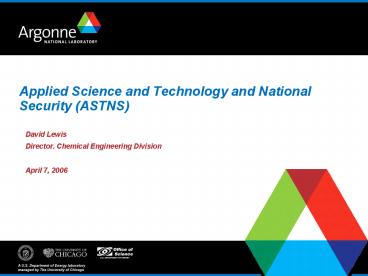Applied Science and Technology and National Security ASTNS - PowerPoint PPT Presentation
1 / 18
Title: Applied Science and Technology and National Security ASTNS
1
Applied Science and Technology and National
Security (ASTNS)
- David Lewis
- Director. Chemical Engineering Division
- April 7, 2006
2
Argonne National Laboratory
- Government-owned, contractor-operated (GOCO)
research facility founded 1943 designated
national lab 1946 - Managed by The University of Chicago
- 3100 employees
- 479 M budget
- 1800 acres in Illinois
- The pioneer of most nuclear technologies
- Builds and operates major national User
Facilities (Advanced Photon Source, Intense
Pulsed Neutron Source, Atmospheric Radiation
Monitoring facility, etc.) - Multi-program/multidisciplinary research
Research Sponsors
- DOE
- Other Federal Agencies (DHS, DOD, EPA, USDA,
etc.) - State and Local Governments
- Private Sector
3
Applied Science and Technology and National
Security(ASTNS)
4
ASTNS Mission
- Energy and Environmental Technologies
- Development of advanced fossil, nuclear,
energy-efficient and renewable energy
technologies RD on environmental restoration
and waste management technologies biotechnology
RD - Industrial and Manufacturing Technology
- Cooperative research with U.S. industry to
develop advanced technologies that improve energy
efficiency, productivity, product quality, and
global competitiveness - Basic Research
- Fundamental research to support development of
energy, environmental, biotechnical and
industrial technologies and to advance scientific
understanding generally
5
ASTNS Mission (continued)
- Research Facilities
- Development and operation of engineering,
nuclear, geophysical, and biotechnical research
facilities, including development of instruments
and methods for facilities-centered research. - Technical Evaluation
- Characterization and evaluation of nationally
important DOE projects and technology options of
national importance.
6
ASTNS FY06 Estimated Operating Costs by DOE
Sponsor
7
ASTNS FY06 Estimated Operating Costs by WFO
Sponsor
Private Sector (11.0M)
Other DOE Contractors (10.0M)
Other Federal Agencies (65.0M)
WFO Total 86.0M
Total DOE and WFO Funding 184.0M
8
ASTNS Employees By Division
9
Decision and Information Sciences Division
- Develops and applies
- Models
- Information systems
- Decision tools
Control Center
Residential Loads
Industrial Loads
Commercial Loads
10
Energy Systems Division
- Research performed at bench, full, or pilot plant
scale - Large, complex facilities
- Teamed with industrial partners
- Environmental field evaluations
Materials Separation Facility
EMD Engine Test Facility
Salt-cake Pilot Facility
Bedrock Fracture Investigations
11
Nuclear Engineering Division Overview
Mission
- Advance the design and operation of nuclear
energy systems apply expertise in nuclear energy
and related areas to current and emerging
programs of national and international
significance. - Strategic Goals
- To design and build the next generation nuclear
energy system. - To be recognized and utilized as the worlds
experts on the nuclear fuel cycle. - To enhance energy security by resolving key
issues of current and near-term nuclear power
systems. - To apply expertise in nuclear technologies and
related areas to enhancing global security and
environmental quality.
Major Capabilities
- Nuclear Systems Modeling and Design Analysis
- Nuclear Systems Technologies
- National Security Non-Proliferation
Technologies - Engineering Experimentation
- Engineering Computation and Design
- Risk and Safety Assessment
12
Environmental Sciences Division
to advance informed environmental decision
making
Environmental ManagementSystems
Risk Waste Management
Restoration Pollution Prevention
Environmental Policy Analysis
Natural Resource Systems Integrated Assessments
13
Chemical Engineering Division - Research and
Capabilities
- Pyrochemical reprocessing of spent fuels
- Aqueous separations
- Repository testing and modeling
- Trace analysis of radionuclides
- Domestic nuclear event attribution
- Materials engineering
- Hydrogen Initiative
- Fuel cells
- Batteries
- Catalysis
14
Nuclear Operations Division
- Nuclear Reactor Safety
- High Temperature Superconductivity Applications
- New Materials Development
- Support for other Argonne Programs
15
Argonnes Transportation Research Focuses
onThree Major Areas
Transportation Systems Hazardous materials
System simulations
Automobiles Higher efficiency Lower
emissions Cost effectiveness
Heavy Vehicles Trucks Railroad
16
Biotechnology Applications
Biobased Products
Pathway Engineering
Bioprocessing and Separations
Environmental Biotechnology
Microbial Corrosion
Phytoremediation
17
Fossil Energy Program
Minimal impact fuels production and supply
Environmentally conscious power generation
Membrane Technologies
18
ASTNS Activities Occur in Many Off-Site Locations
- Established meteorological sites in Oklahoma,
Kansas, Alaska, and the South Pacific - Military sites
- Other DOE sites (e.g., Fermilab, Sandia, Savannah
River) - Sites managed by other federal agencies
- Industrial sites
- Foreign countries































